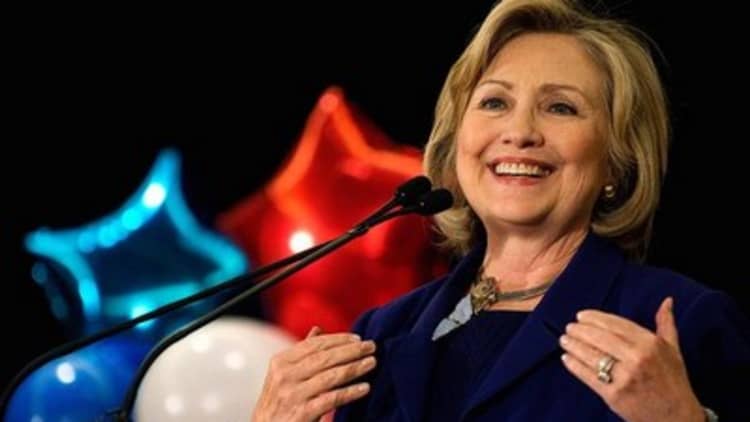As the long Memorial Day weekend approaches, now is as good a time as any to assess the state of the 2016 presidential race in its very early stages. Two conclusions are obvious: The race is Hillary Clinton's to lose and there is absolutely no front-runner on the Republican side.
Starting with the Democrats, Clinton continues to have no serious challenger for the nomination. Vermont independent and self-proclaimed socialist Bernie Sanders will offer hard-core liberals someone to cheer for in debates. But he will draw few actual votes. And he will likely have to share the anti-Clinton vote with former Baltimore Mayor Martin O'Malley and probably a couple of others.
The only potentially serious challenger to Clinton—Massachusetts Sen. Elizabeth Warren—is not getting in the race, barring some massive change of heart or other cataclysmic event. And with a couple of less-potent liberal alternatives, Clinton will face little pressure to tack hard to the left in ways that could make the general election difficult.
Clinton can safely continue her cocoon campaign strategy—talk to preselected voters and avoid the press—for many months to come. It's infuriating to reporters and bad for democracy but Clinton has no real incentive to take questions on her blossoming email problems, the Clinton Foundation's fundraising issues, the Benghazi attack or any other unfriendly storyline.
She might want to start facing those questions late in the year before the actual voting starts just to toughen up for the general election. But she has plenty of time to hone her answers. Former Florida Gov. Jeb Bush's missteps on the Iraq War offer Clinton a clear example of what happens when you wade into press questions without a clear plan of what to say.
Read More Obama faces much bigger trade fight in the House
On the Republican side, Bush has ceded his spot as the early front-runner. He will still have the most money—possibly by a large margin—but he has struggled badly with his message and faces a likely loss in Iowa with no guarantee of a follow-up win in New Hampshire to gain momentum.

Bush is now in a triumvirate of leading candidates along with Wisconsin Gov. Scott Walker and Florida Sen. Marco Rubio, according to the Real Clear Politics average of public polls and interviews with GOP insiders.
All three have significant problems. Bush is clearly out of practice, has family baggage and turns off many activist Republicans who are key to winning the nomination. Walker is a lackluster public speaker who has also struggled when faced with tough questioning. Rubio is relatively inexperienced and also struggled this past weekend over Iraq questions as well as why he cashed out a retirement account with $68,000 in it.
Senior Republican insiders also note that the party may not want to nominate a young, first-term senator given what they view as the failings of another of that profile: President Barack Obama.
Sen. Rand Paul of Kentucky could still catch fire and unite a broad coalition of tea party voters and libertarians but his route to the nomination is possibly the hardest in the GOP field.
The rest of the ballooning GOP crowd of candidates and potential candidates (Ted Cruz, Rick Perry, Carly Fiorina, Mike Huckabee, Chris Christie, Bobby Jindal, Lindsey Graham, Ben Carson, John Kasich and possibly others) are all hoping to find a window if the front-runners fade. Anything could happen on the GOP side but the party tends to nominate the safest choice. So Bush, Walker or Rubio right now remain the most likely to get the nod. But the race is likely to be long, expensive and ugly. And whoever winds up winning it will go into the general as a significant underdog to Clinton.
Read MoreThe ridiculousness of the Obama/Warren sexism flap
That's because the electoral map already tilts in Clinton's favor. She starts with a presumed 247 electoral votes to 206 for the Republican. She could even win without taking either Ohio or Florida (the biggest toss-up prizes) if she can cobble together some of the smaller states that remain anyone's to win, a group that includes Nevada, Colorado, Iowa, Virginia and New Hampshire. The Clinton campaign is hoping to keep Obama's advantage with younger voters, Latinos and African-Americans, and drive an even bigger gender gap with women eager to elect the first female president.
Clinton is not Obama's match as an inspirational politician (as 2008 demonstrated). And voters tend not to give the same party the White House for three terms in a row. But the electoral map, demographics and Clinton's play-it-safe approach all make her the likely next president.
Unless she blows it. And she could easily blow it. Republicans have a target-rich environment to go after Clinton on her personal wealth and the various issues listed above. If they succeed in turning one or more of those issues into a serious liability while nominating a candidate without crushing that person in a bitter primary fight, the general election could turn into a real battle.
But if they do not, the most-likely scenario is that Hillary Clinton will face off against Jeb Bush, Scott Walker or Marco Rubio and beat them.
—Ben White is Politico's chief economic correspondent and a CNBC contributor. He also authors the daily tip sheet Politico Morning Money [politico.com/morningmoney]. Follow him on Twitter @morningmoneyben.


